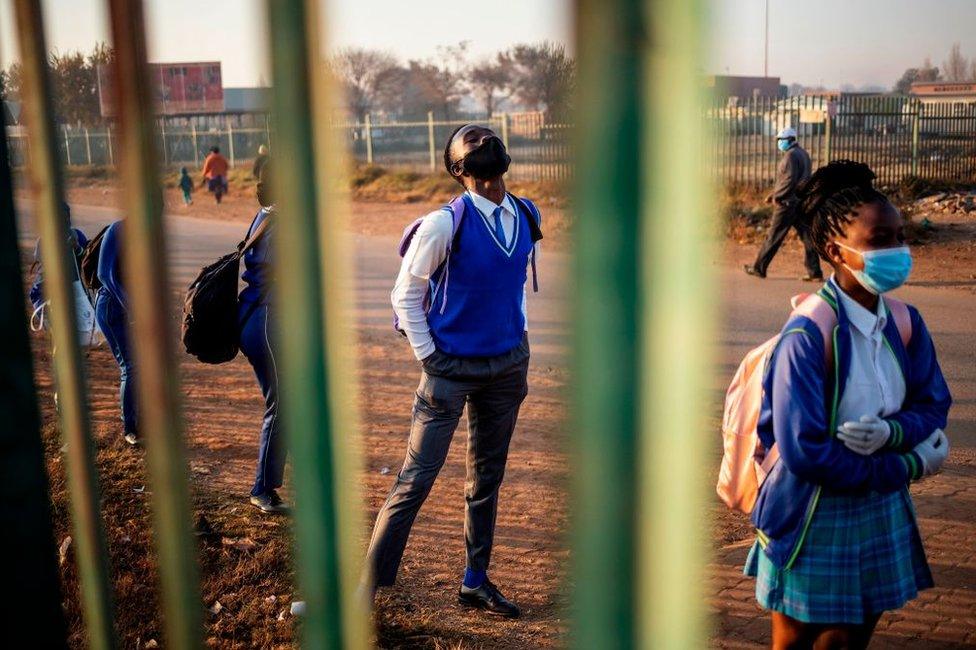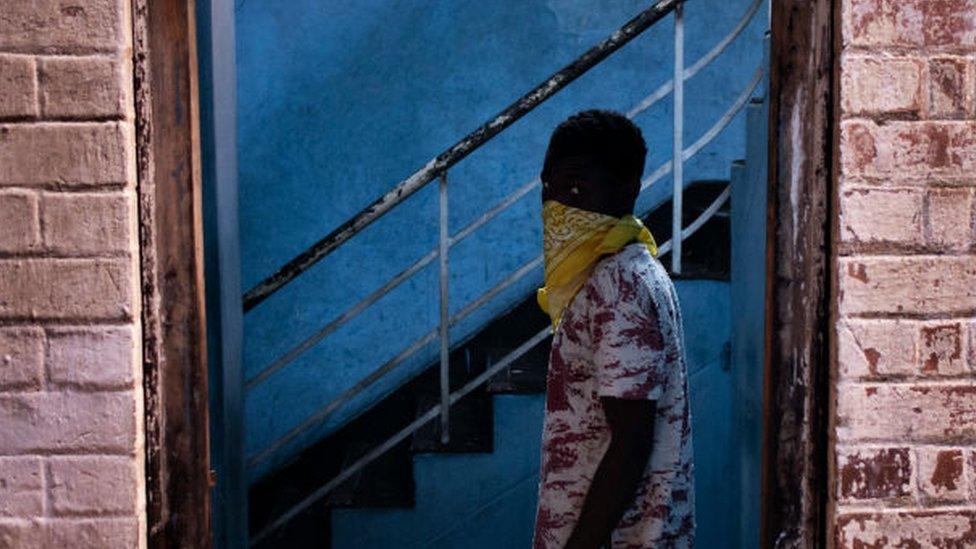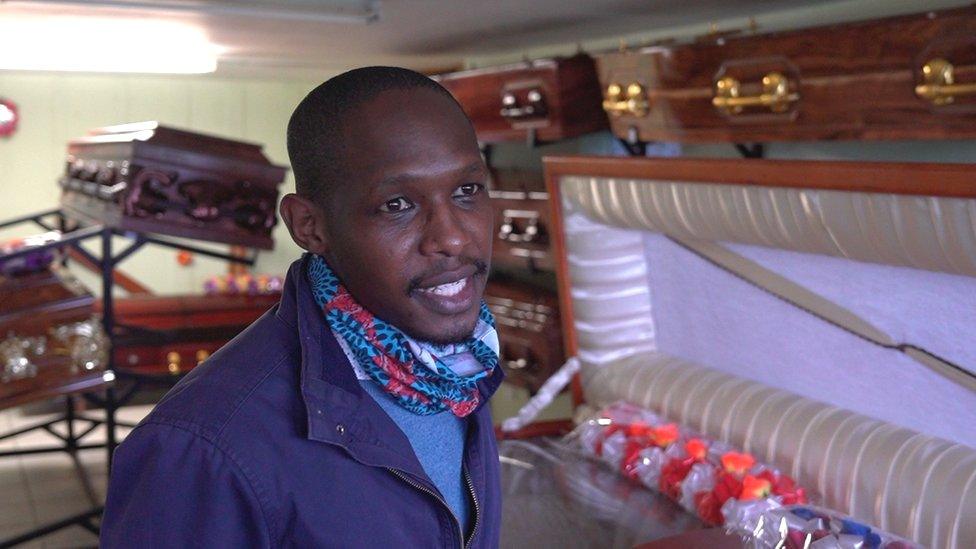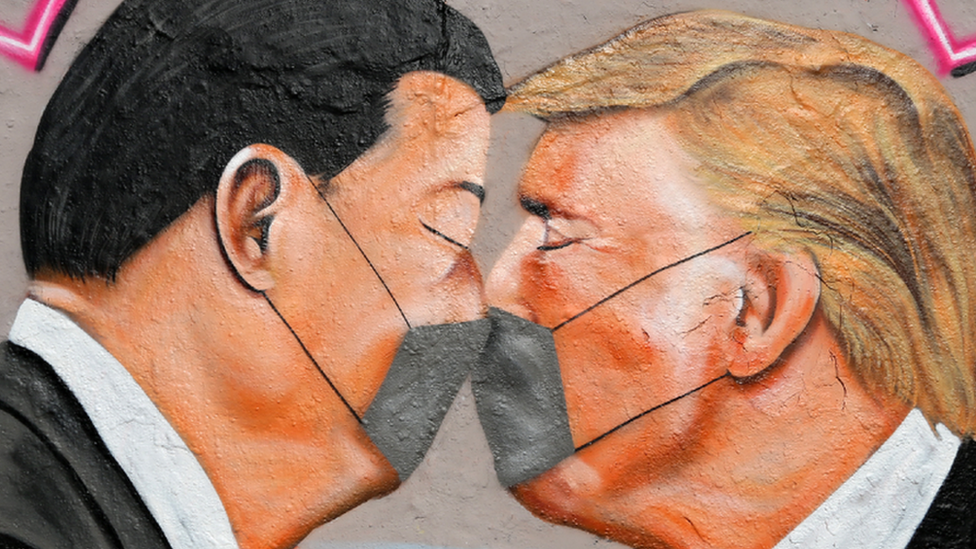Coronavirus in South Africa: Unravelling the mystery
- Published

As South Africa confronts a second wave of Covid-19 infections, scientists say new evidence indicates that at least a quarter of the country's population - and possibly more than a third - may already have been infected by the virus during its first wave, which peaked in July.
South Africa's unusually high infection rate - potentially far higher than in some European nations after their first waves - appears to have been accompanied by an uncommonly low death rate, with early data from one province suggesting that the Covid-19 mortality rate was less than half that experienced in the worst-hit countries.
Scientists warn that their preliminary figures could go up or down as more data becomes available in the coming weeks.
A total of 19,000 people will be involved in a string of nationwide surveys. Experts also note the risks involved in trying to extrapolate from one country to the rest of a continent.
But, if confirmed, these findings could have huge significance in South Africa and beyond, and might help to shed light on the reasons behind the relatively low death rate seen in many African countries, as well as helping governments to understand which communities are most at risk from the virus and how best to modify economically damaging lockdowns.
Coronavirus in South Africa: A day in the life of a contact tracer
On a recent, rainy morning in Soweto, a group of health workers moved from one community to the next, taking blood tests to check for antibodies that indicate past infection by Covid-19. This type of survey is considered a far more accurate system for measuring a country's overall infection rate than trying to extrapolate from laboratory and hospital data.
"These surveys are very important. There's still so much that is just unknown," said Dr Portia Mutevedzi, a senior epidemiologist at Chris Hani Baragwanath Academic Hospital in Soweto.
'No lockdown' in Soweto
Early results have shown a 25% infection rate in some areas, but another recent survey of participants in a vaccine trial came back with a rate of 35%, while a different group of people, living with HIV in the Western Cape hit 42%, and scientists say the real figure could be even higher in some regions, given the likelihood of false negatives as antibodies disappear over time.
The comparatively low death rates from the pandemic reported in South Africa and in many other African countries have been widely attributed by experts to demographics - with the average age on the continent roughly half that of Europe and the United States - and also to early and aggressive lockdown measures taken by many African governments, which undoubtedly helped to delay the spread of the virus and bought valuable time for countries to prepare.
Africa accounts for 17% of the global population, but approximately 3% of reported pandemic deaths. In South Africa, the official death toll stands at more than 23,000, although experts believe the true figure - as indicated by total excess deaths - is likely to be considerably higher.

Some 19,000 people will be involved in a string of nationwide surveys
But three senior epidemiologists involved in seroprevalence surveys in South Africa told the BBC that the emerging data could also prove, or disprove, the hypothesis that people living in high-density areas might have some extra level of immunity to Covid-19 because of greater prior exposure to other diseases.
"It's a real scientific mystery," said Dr Mutevedzi. "I think it's a real possible scientific theory that [because] these crowded areas have always been prone to disease and had high infection rates so maybe that has somehow prevented them from having severe Covid-19 or from actually being infected with Covid."
She played down the impact of government restrictions, saying that, in practice, there had been "no lockdown" in much of Soweto since people had often struggled to adhere to the rules.
"The mortality is lower here. Something has to explain it. Many people live in quite crowded settings and one theory is that pre-existing antibodies to other coronaviruses are cross-reacting," said Prof Helen Rees, a prominent vaccine expert at Wits University.
"Well, that's my hypothesis - that people in lower-income countries are more like to be exposed because the same thing holds true for other respiratory viruses as well as bacteria. I don't say it's a slam dunk, but it's a high probability," said Prof Shabir Madhi, who is leading a key seroprevalence survey in Gauteng province. He also oversaw South Africa's trials for the Oxford/AstraZeneca Covid-19 vaccine.

You may also be interested in:

"We need to keep an open mind. The science is very preliminary," warned Prof Salim Karim, who chairs the South African government's advisory panel on the pandemic, and who expressed concern about people singling out individual studies to suit a particular "ideology".
But research carried out in Tanzania and Zambia, and reported in the International Journal of Infectious Diseases, has also found evidence of significantly high levels of "cross-reactivity" in the population - raising the possibility of greater immunity to Covid-19 because of prior exposure to other diseases.
Scientists in Kenya have also been carrying out seroprevalence tests to better understand what they described, in the journal Science, as "the impression that disease may be attenuated (weakened) in Africa." Their preliminary data showed that Covid-19's prevalence was "considerably higher than was previously thought".
'Complete hogwash'
In South Africa, Prof Madhi said the early evidence from such tests indicated that it was wrong for African governments to take too much credit for containing the new virus.
"That's complete hogwash. That's a very naïve, simplistic understanding of what is occurring in Africa. We've been highly fortunate, partly because of the age demographic, but also because of some underlying factor that is assisting people in terms of preventing them from becoming severely ill," said Prof Madhi.
"Africa was forewarned and a bit more prepared, and implemented a number of stringent lockdown measures. But I think it's also a bit overambitious to say that is why we didn't see a lot of cases in Africa," said Dr Mutevedzi.

Prof Madhi also took aim at the World Health Organization and the African Union, which have been at the forefront of coordinating the continent's response to the pandemic.
"There is a narrative that the WHO has kept on top of this… and that African governments have been successful because they were very proactive. As far as I'm concerned, it's complete nonsense," he said.
'A bit frustrating'
But in Nairobi, Dr Ngoy Nsenga, who coordinates the WHO's Covid-19 response in Africa, hit back against that criticism.
"We observe our region has been least-affected so far. The pattern of the pandemic is different here. What we are saying is that it is a combination of factors," he said.
"The hypothesis of cross-immunity - of people having some kind of immunity to Covid-19 - is plausible. But clearly human interventions played a role. It's a little bit frustrating to us - this kind of [idea] that Africans can't do it by ourselves. It's as if other [parts of the world] took the right steps, but African countries were just helped by the weather, by youth, by other factors."
It is unclear, for now, to what extent the findings in South Africa - which has by far the continent's largest recorded epidemic - can be applied to other parts of Africa, or indeed to countries like India. Prof Madhi said the key was to compare "like with like".
In other words, to compare relatively high-density areas like Soweto, with similar neighbourhoods in cities like Mombasa or Accra. Early results from an ongoing seroprevalence test in South Africa's sparsely populated North-West province appears to confirm that the virus has struggled to make any serious inroads into more rural areas.

GLOBAL SPREAD: Tracking the pandemic
How not to wear a face mask

Related topics
- Published8 August 2020

- Published3 July 2020

- Published9 June 2020

- Published9 July 2024
